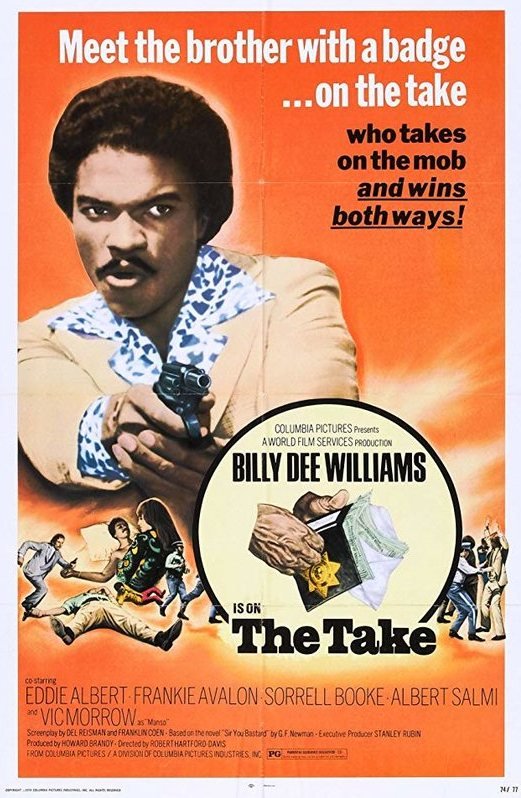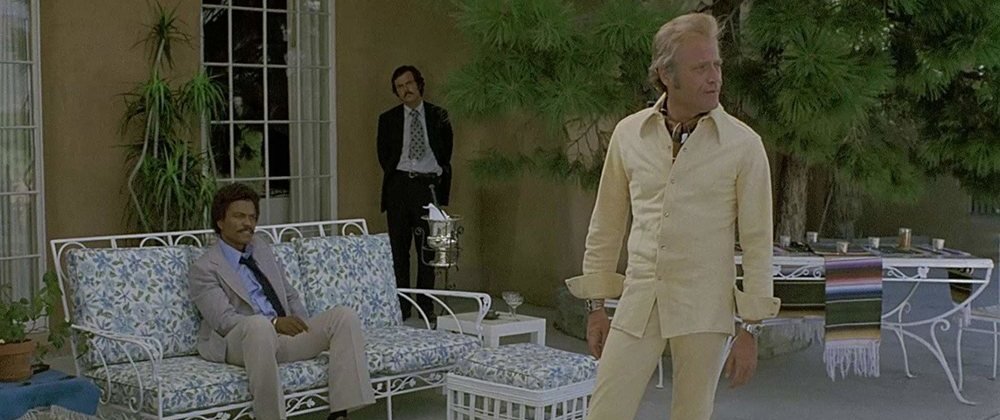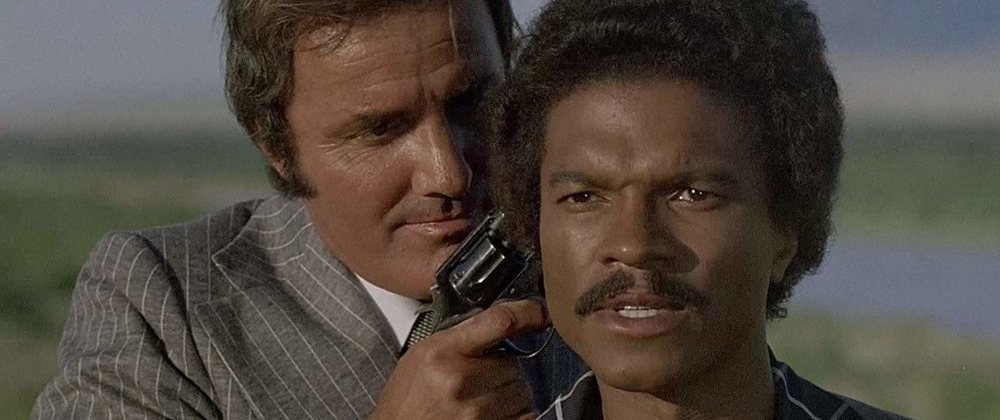THE TAKE (1974): When The Cops Are Also The Robbers
The '70s was one of the peak eras for cynicism in American cinema, reflecting the malaise of Watergate, the Vietnam War and domestic ills like inflation and oil shortages. It was a time to doubt everyone and everything - and subverting the familiar narrative concepts of genre filmmaking offered a beautiful way to convey that doubt.That cynicism filtered down into genres of all kinds: horror movies, Westerns, thrillers, mysteries and cop films all indulged their darkest, most pessimistic extremes during this time. For an interesting example the last genre on that list from the '70s, consider The Take. It's not as famous as better known cynical cop fare like Dirty Harry or The French Connection but it offers an interesting example of how the needs of the cop film synched up perfectly with the cynicism of the age. Morally speaking, it's also one of the darkest examples of the genre from its era. The Take begins with San Francisco detective Terry Sneed (Billy Dee Williams) flying out to New Mexico for a special assignment at the behest of Chief Berrigan (Eddie Albert) to deal with the local rise of organized crime. He quickly establishes his worth when he takes the lead in stopping a courtroom escape by armed prisoners... but he also reveals a dark side by meeting up with local mobster Manso (Vic Morrow), who is eager to put him on the payroll and derail his organized crime investigation. Terry seems determined to take him down but curiously has no problem taking his cash.You would expect there to be a reveal at some point that Terry is working undercover to root out corruption at the police level... but such a reveal never arrives. He's simply determined to make as much money as he can while still doing his job as a cop: in fact, he places as much importance on managing his corrupt gains as he does to his police work. Rivals like local crooked cop Dolek (Albert Salmi) and Manso's second-in-charge Benedetti (James Luisi) try to put Sneed in his place but he has the ability to change up his hustle to match the shifting circumstances of cop/crook relations. That said, his ever-growing list of foes both sides are determined to give him a run for his ill-gotten money.The Take is fascinating because at heart it is a traditional cops-and-crooks programmer, complete with strategically timed shootouts and car chases, but it plays out in a dark and compelling manner because it presents the theme of corruption in disarmingly casual, matter-of-fact manner. Beyond a dialogue exchange that gives a motivation for Sneed's corruption, it never tries to explore his reasons too deeply. The film simply presents the viewer with a hopelessly immoral world where any sensible person takes the blood money that's being offered and the only successful people are the ones immoral enough to stay two steps ahead of all the other crooked types.
The Take begins with San Francisco detective Terry Sneed (Billy Dee Williams) flying out to New Mexico for a special assignment at the behest of Chief Berrigan (Eddie Albert) to deal with the local rise of organized crime. He quickly establishes his worth when he takes the lead in stopping a courtroom escape by armed prisoners... but he also reveals a dark side by meeting up with local mobster Manso (Vic Morrow), who is eager to put him on the payroll and derail his organized crime investigation. Terry seems determined to take him down but curiously has no problem taking his cash.You would expect there to be a reveal at some point that Terry is working undercover to root out corruption at the police level... but such a reveal never arrives. He's simply determined to make as much money as he can while still doing his job as a cop: in fact, he places as much importance on managing his corrupt gains as he does to his police work. Rivals like local crooked cop Dolek (Albert Salmi) and Manso's second-in-charge Benedetti (James Luisi) try to put Sneed in his place but he has the ability to change up his hustle to match the shifting circumstances of cop/crook relations. That said, his ever-growing list of foes both sides are determined to give him a run for his ill-gotten money.The Take is fascinating because at heart it is a traditional cops-and-crooks programmer, complete with strategically timed shootouts and car chases, but it plays out in a dark and compelling manner because it presents the theme of corruption in disarmingly casual, matter-of-fact manner. Beyond a dialogue exchange that gives a motivation for Sneed's corruption, it never tries to explore his reasons too deeply. The film simply presents the viewer with a hopelessly immoral world where any sensible person takes the blood money that's being offered and the only successful people are the ones immoral enough to stay two steps ahead of all the other crooked types. The film's moral darkness resonates because it is presented in a casual, unadorned manner by all involved. The script never hedges its thematic bets and instead doubles down as it progresses, with even the initially decent characters either looking the other way or giving in when faced with the breakdown of morality. The direction of English vet Robert Hartford-Davis, known to exploitation fans for sleazy horror/thriller material like Corruption, evokes a style similar to Michael Winner here: the execution of the action sequences is crisp, coldly slick visuals make the most of the New Mexico settings and it presents the film's immoral elements in a take-it-or-leave-it kind of way.The performances seal the morally bleak tone of the film, with everyone digging into a series of characterizations that are a little more complex and interesting than you might expect. Williams sets the tone with a performance where he uses his star charm as a sphinx-like mask for an icy, calculating demeanor. Morrow is similarly interesting as a gangster who is saddled with heart ailments but still finds ways to communicate menace.The support performances are similarly strong: a young A Martinez pops up as a junior officer who studies Terry's style, Albert offers an intriguingly haunted performance as a police chief aware of his waning abilities and Salmi adds a bit of gallows humor as another crooked cop who is not as clever as Terry but still perceptive. Elsewhere, Sorrell Booke lends solid, quiet support as Sneed's bluntly pragmatic money man and Luisi underplays effectively as Manso's loyal, violent henchman. There's even a scene stealing performance from ex-teen idol Frankie Avalon as a fiery small-time crook with a secret fear of policemen (seriously, his work is worthy of a Police Story guest appearance here).
The film's moral darkness resonates because it is presented in a casual, unadorned manner by all involved. The script never hedges its thematic bets and instead doubles down as it progresses, with even the initially decent characters either looking the other way or giving in when faced with the breakdown of morality. The direction of English vet Robert Hartford-Davis, known to exploitation fans for sleazy horror/thriller material like Corruption, evokes a style similar to Michael Winner here: the execution of the action sequences is crisp, coldly slick visuals make the most of the New Mexico settings and it presents the film's immoral elements in a take-it-or-leave-it kind of way.The performances seal the morally bleak tone of the film, with everyone digging into a series of characterizations that are a little more complex and interesting than you might expect. Williams sets the tone with a performance where he uses his star charm as a sphinx-like mask for an icy, calculating demeanor. Morrow is similarly interesting as a gangster who is saddled with heart ailments but still finds ways to communicate menace.The support performances are similarly strong: a young A Martinez pops up as a junior officer who studies Terry's style, Albert offers an intriguingly haunted performance as a police chief aware of his waning abilities and Salmi adds a bit of gallows humor as another crooked cop who is not as clever as Terry but still perceptive. Elsewhere, Sorrell Booke lends solid, quiet support as Sneed's bluntly pragmatic money man and Luisi underplays effectively as Manso's loyal, violent henchman. There's even a scene stealing performance from ex-teen idol Frankie Avalon as a fiery small-time crook with a secret fear of policemen (seriously, his work is worthy of a Police Story guest appearance here). It all adds up to a programmer made fascinating by how it deploys sturdy craftsmanship and an uncompromisingly bleak take on modern morality. From its icy antihero to its unscrupulous version of a happy ending, The Take is as cynical as '70s American cinema gets.
It all adds up to a programmer made fascinating by how it deploys sturdy craftsmanship and an uncompromisingly bleak take on modern morality. From its icy antihero to its unscrupulous version of a happy ending, The Take is as cynical as '70s American cinema gets.


